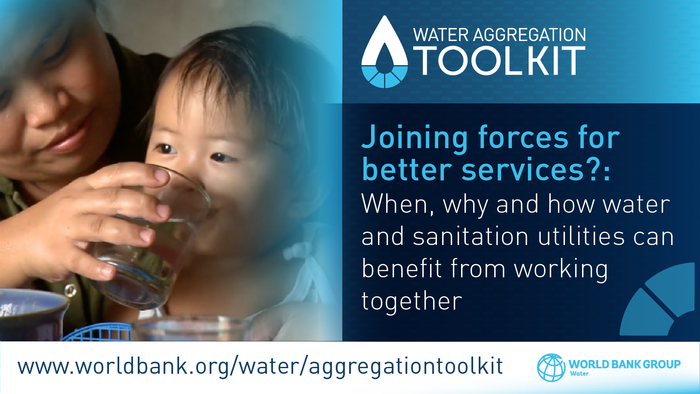The year is 2006, the scene is Honduras. As an enthusiastic new team member of a
World Bank water sector reform project, I am trying to participate in the high-level discussions around decentralization and local government empowerment in the provision of water and sanitation services in my (then) broken Spanish. Coming from Switzerland, a small country with thousands of local service providers, I am convinced a bottom-up approach to service delivery is THE solution. Hasn’t the hugely influential
2004 World Development Report argued for exactly that – shortening the accountability route between customers and service providers? We are the champions of local, elected mayors, who want nothing more than to prove they could deliver better than the central government’s utility.
It’s now 2010 and I’m still in Honduras, now amid the reform implementation when reality kicks in. Three new municipal utilities have been established, with catchy logos and new staff and management. Operating costs, salaries in particular, have been slashed, and there’s a sense of opportunity – but also challenges. Those elected mayors are thinking about the next election and not very keen on adjusting tariffs to where they need to be. Installing water meters, a cornerstone of the modernization strategy, is facing a huge backlash from those very customers who are making direct use of the shorter accountability route to make their concerns heard. And services aren’t really getting better as fast as we would want…
Forward to 2014 – I’m now in Croatia. I’m sitting in a non-descript conference hall in Zagreb, Croatia, trying to inform a diverse set of local and central government stakeholders about the pros and cons of merging municipal water utilities into regional operators, as everyone else seems to be doing in the region. In fact, since my transition to Europe & Central Asia the year before, I observe what appears to be a serious case of reformitis: consultants and policy advisors are dutifully preaching the regionalization of just recently decentralized service providers to help implement the European Union’s stringent and costly environmental regulations.
Here in Zagreb though, the meeting is not going all that well. The reform that is on the table means a lot of change for local actors. Mayors are concerned about losing power. Utility managers are concerned about losing their job. And customer representatives are concerned about losing their direct route to the decision makers. But a solid economic study financed by another Bank project has shown this is the only way Croatia can carry the technical and financial burden of complying with the famous European Environmental Acquis Communautaire, and so the team is trying to promote a sector reform that goes pretty much in the opposite direction of Honduras’… Ultimately, the Croatia reform didn’t happen; but a number of other countries around the region are moving forward on a similar path, with varying degrees of success. By then, I am leading the Danube Water Program, a regional policy advice facility, and I struggle with reconciling those contradicting trends – decentralization here, aggregation there, and my home country’s “small is beautiful” vs. the “bigger is better” of the region’s policy buffs. Facing a policy challenge, I decide to seek out the best available evidence by launching a study, with support from the Government of Austria.
We start by looking at what others have said on the topic, and in particular the Bank’s own, seminal piece on utility aggregation. We quickly realize the issue is both larger and less defined than we thought. Everyone seems to have studied economies of scale in the water sector – but far fewer have looked whether those will materialize when utilities joining together, so we feel the need to cast the web wider than we initially imagined. We look at the Merger and Acquisition literature, at the work of our colleagues in electricity and local government sectors. One thing leads to another, and we eventually manage to secure enough resources to expand to a global review covering 14 case studies and 1300 utility companies worldwide. More importantly, colleagues and practitioners tell us what they really need is concrete, pragmatic advice rather than another academic study. That was good advice and I took it to heart.
It’s now 2017 and I’m in Washington DC at the latest leg of my journey. Just a few days ago the World Bank’s Water Global Practice launched a toolkit and background report that explores why, when and how water utilities can work together to provide better services. This is the culmination of a years-long team effort and, for me, a particular satisfaction to have even more evidence to inform our policy advice on the matter. As often, the conclusions are more nuanced than my (and many of my colleagues’) Cartesian mind would like. The success of an aggregation depends very much on your starting point and what you are trying to achieve, and so you really need to think about those two points as you design your reform process…. But I don’t want to give all the insights away – check out the toolkit, discover the case studies, listen to the interviews and read the report if you want to know more!

It’s now 2010 and I’m still in Honduras, now amid the reform implementation when reality kicks in. Three new municipal utilities have been established, with catchy logos and new staff and management. Operating costs, salaries in particular, have been slashed, and there’s a sense of opportunity – but also challenges. Those elected mayors are thinking about the next election and not very keen on adjusting tariffs to where they need to be. Installing water meters, a cornerstone of the modernization strategy, is facing a huge backlash from those very customers who are making direct use of the shorter accountability route to make their concerns heard. And services aren’t really getting better as fast as we would want…
Forward to 2014 – I’m now in Croatia. I’m sitting in a non-descript conference hall in Zagreb, Croatia, trying to inform a diverse set of local and central government stakeholders about the pros and cons of merging municipal water utilities into regional operators, as everyone else seems to be doing in the region. In fact, since my transition to Europe & Central Asia the year before, I observe what appears to be a serious case of reformitis: consultants and policy advisors are dutifully preaching the regionalization of just recently decentralized service providers to help implement the European Union’s stringent and costly environmental regulations.
Here in Zagreb though, the meeting is not going all that well. The reform that is on the table means a lot of change for local actors. Mayors are concerned about losing power. Utility managers are concerned about losing their job. And customer representatives are concerned about losing their direct route to the decision makers. But a solid economic study financed by another Bank project has shown this is the only way Croatia can carry the technical and financial burden of complying with the famous European Environmental Acquis Communautaire, and so the team is trying to promote a sector reform that goes pretty much in the opposite direction of Honduras’… Ultimately, the Croatia reform didn’t happen; but a number of other countries around the region are moving forward on a similar path, with varying degrees of success. By then, I am leading the Danube Water Program, a regional policy advice facility, and I struggle with reconciling those contradicting trends – decentralization here, aggregation there, and my home country’s “small is beautiful” vs. the “bigger is better” of the region’s policy buffs. Facing a policy challenge, I decide to seek out the best available evidence by launching a study, with support from the Government of Austria.
We start by looking at what others have said on the topic, and in particular the Bank’s own, seminal piece on utility aggregation. We quickly realize the issue is both larger and less defined than we thought. Everyone seems to have studied economies of scale in the water sector – but far fewer have looked whether those will materialize when utilities joining together, so we feel the need to cast the web wider than we initially imagined. We look at the Merger and Acquisition literature, at the work of our colleagues in electricity and local government sectors. One thing leads to another, and we eventually manage to secure enough resources to expand to a global review covering 14 case studies and 1300 utility companies worldwide. More importantly, colleagues and practitioners tell us what they really need is concrete, pragmatic advice rather than another academic study. That was good advice and I took it to heart.
It’s now 2017 and I’m in Washington DC at the latest leg of my journey. Just a few days ago the World Bank’s Water Global Practice launched a toolkit and background report that explores why, when and how water utilities can work together to provide better services. This is the culmination of a years-long team effort and, for me, a particular satisfaction to have even more evidence to inform our policy advice on the matter. As often, the conclusions are more nuanced than my (and many of my colleagues’) Cartesian mind would like. The success of an aggregation depends very much on your starting point and what you are trying to achieve, and so you really need to think about those two points as you design your reform process…. But I don’t want to give all the insights away – check out the toolkit, discover the case studies, listen to the interviews and read the report if you want to know more!



Join the Conversation